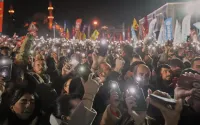2 July 2005Znet / New Statesman
Show me an environmentalist, and I will show you a hypocrite. In an interview with the Guardian recently, Chris Martin, the lead singer of Coldplay and all-round good guy, spoke of his concerns about climate change. On his new album there's "an intense, angry track encouraging people to make the right decisions about how they live their lives and how they treat the planet." A few paragraphs on, he revealed that he was about to "fly by private jet to Palm Springs ... The band can now afford to fly wherever possible".(1) Neither Martin nor the interviewer appeared to recognise the contradiction.
At the beginning of his "Organic Bible", Bob Flowerdew explains that organic gardening means minimising "any bad effects we may have on the environment." He goes on to boast that "when most people are only planting their [new potatoes] on Good Friday ... I am eating mine." How? By growing them in a heated greenhouse.
I do not excuse myself. I rail against cars, but try to forget about the impact of the train journeys I take. I convince myself that when I fly to other countries, the work I do there somehow counteracts the effect of my carbon emissions. There's no environmental difference, of course, between my journey and that of the person next to me. And as for flying to my in-laws' home in Sweden ...
But I'm not half as bad as most prominent environmentalists. I know men and women who spend their lives telling other people what not to do, but take their holidays snorkelling in the Pacific, throw their bottles and cans in the bin, eat tuna and cod. I don't know how many times I have seen that embarrassed smirk when I've asked, apple core in hand, where the compost bin is.
In the absence of government action, environmentalism is, and always will be, for other people. At its best, it is a faltering and contradictory effort to do the right thing. At its worst, and especially when articulated by the elite, it is a means of securing ecological space for yourself against the competing claims of the hoipolloi. The environment movement in Britain and its colonies arose in part from anti-poaching efforts: game reserves were turned into nature reserves for the continued benefit of the hunting class. Will climate change campaigns now reserve airspace for pop stars?
Nothing of any substance can happen through self-enforced abstinence. However well-meaning we are, we will overlook our own assaults on nature, while recognising other people's. We will persuade ourselves that we are doing the right thing by making the odd meaningless gesture, while continuing to consume as much as our credit cards allow. The only way in which climate change, or any other environmental impact, can be addressed is through government action: rules and taxes which apply to everyone, rather than to everyone else.
"Consumer democracy", "voluntary simplicity" and "mindful living" have proved to be a disastrous distraction from the political battle. They don't work for all sorts of reasons, but above all because of the staggering hypocrisy of well-meaning people. If we want to change the world, we must force governments to force us to change our behaviour.
This, of course, is the last thing they want to do. The leaked drafts of the G8's climate change agreement have placed the future in square brackets. The latest version refuses even to accept that climate change is taking place, let alone that anything should be done about it. Tony Blair is as big a hypocrite as any of us, boasting that "we have led the world in setting a bold plan and targets for reducing greenhouse gas emissions",(2) while planning an airport expansion sufficient, by itself, to cancel out all the initiatives he's launched.
As he admits, "there is a mismatch in timing between the environmental and electoral impact".(3) By the time the decisions he makes come home to roost, he will be writing his memoirs. The political cost of preventing us from spending our money as we please is high, while the political cost of letting us get on with it is low. Our task must be to raise the cost of the second option. We must turn the greatest threat we've ever faced into the world's foremost political issue.
Blair was incautious enough to make climate change "a top priority for our G8 presidency". He has invited us to hold him to account if he fails to call in his political loans to George W Bush, and fails to use all the brutal tactics he has deployed elsewhere to strike a meaningful agreement. But he will listen to us only when we stop pretending that we don't need his help.
www.monbiot.com
References:
1. Craig McLean, 28th May 2005. The importance of being earnest. The Guardian.
2. Tony Blair, 14th September 2004. Speech. No title or location given. http://www.number10.gov.uk/output/page6333.asp
3. ibid.






